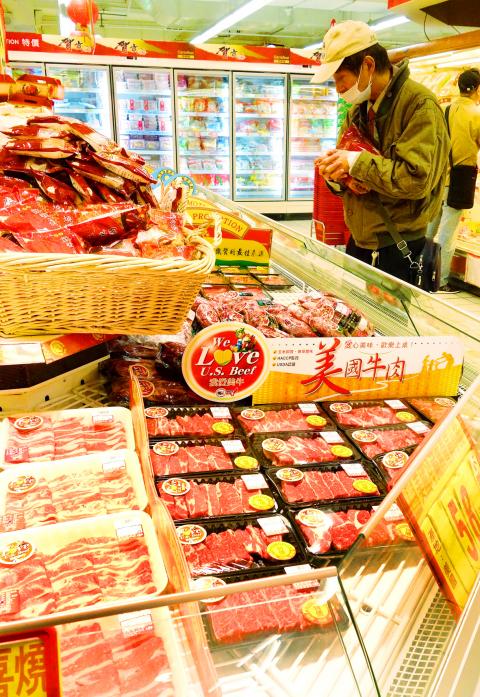The US has once again raised concerns over Taiwan’s ban on its pork and beef products, highlighting the issue in the Office of the US Trade Representative’s (USTR) 2018 Trade Policy Agenda and 2017 Annual Report, and refocusing attention on what has been an obstacle to the two nations signing a free-trade agreement.
In the annual report, the USTR underscored US concerns about Taiwan’s agricultural policies, which it said “are not based upon science.”
That refers to Taiwan’s “zero tolerance” policy on US pork imports containing the leanness-enhancing feed additive ractopamine that was adopted due to lingering concerns about the drug’s safety and strong opposition from local pig farmers.

Photo: Peter Lo, Taipei Times
One of the main priorities for the US in its trade with Taiwan is to remove “Taiwan’s barriers to US pork products and certain US beef products produced using ractopamine,” the report said.
The use of the feed additive is authorized in the US by the US Food and Drug Administration, with about 60 percent to 80 percent of all US pigs fed ractopamine, which explains Washington’s eagerness to eliminate the ban.
While Taiwan has not amended its ban on ractopamine in pork products, which has been in effect since 2006, it relented on its ban of the chemical in beef products in 2012, allowing imports with a maximum residue level of 10 parts per billion.
Ractopamine remains banned in all 27 EU member states, China and Russia.
Another priority for the US is to remove “other barriers to US beef offal products” in Taiwan, the report said.
On the subject of agricultural policy, the report said the US is also focused on Taiwan’s rice procurement systems, restrictions on potatoes with greening, its regulatory process for setting maximum pesticide residue limits, and market access barriers facing US agricultural biotechnology products and certified US organic products.
The report indicated that the US would continue to work under the US-Taiwan Trade and Investment Framework Agreement and through the WTO to address the issues, which are important to US stakeholders.

INVESTIGATION: The case is the latest instance of a DPP figure being implicated in an espionage network accused of allegedly leaking information to Chinese intelligence Democratic Progressive Party (DPP) member Ho Jen-chieh (何仁傑) was detained and held incommunicado yesterday on suspicion of spying for China during his tenure as assistant to then-minister of foreign affairs Joseph Wu (吳釗燮). The Taipei District Prosecutors’ Office said Ho was implicated during its investigation into alleged spying activities by former Presidential Office consultant Wu Shang-yu (吳尚雨). Prosecutors said there is reason to believe Ho breached the National Security Act (國家安全法) by leaking classified Ministry of Foreign Affairs information to Chinese intelligence. Following interrogation, prosecutors petitioned the Taipei District Court to detain Ho, citing concerns over potential collusion or tampering of evidence. The

TRADE: The premier pledged safeguards on ‘Made in Taiwan’ labeling, anti-dumping measures and stricter export controls to strengthen its position in trade talks Products labeled “made in Taiwan” must be genuinely made in Taiwan, Premier Cho Jung-tai (卓榮泰) said yesterday, vowing to enforce strict safeguards against “origin laundering” and initiate anti-dumping investigations to prevent China dumping its products in Taiwan. Cho made the remarks in a discussion session with representatives from industries in Kaohsiung. In response to the US government’s recent announcement of “reciprocal” tariffs on its trading partners, President William Lai (賴清德) and Cho last week began a series of consultations with industry leaders nationwide to gather feedback and address concerns. Taiwanese and US officials held a videoconference on Friday evening to discuss the

NEGOTIATIONS: The US response to the countermeasures and plans Taiwan presented has been positive, including boosting procurement and investment, the president said Taiwan is included in the first group for trade negotiations with the US, President William Lai (賴清德) said yesterday, as he seeks to shield Taiwanese exporters from a 32 percent tariff. In Washington, US Trade Representative Jamieson Greer said in an interview on Fox News on Thursday that he would speak to his Taiwanese and Israeli counterparts yesterday about tariffs after holding a long discussion with the Vietnamese earlier. US President Donald Trump on Wednesday postponed punishing levies on multiple trade partners, including Taiwan, for three months after trillions of US dollars were wiped off global markets. He has maintained a 10 percent

PERSONAL DATA: The implicated KMT members allegedly compiled their petitions by copying names from party lists without the consent of the people concerned Judicial authorities searched six locations yesterday and questioned six people, including one elderly Chinese Nationalist Party (KMT) member and five KMT Youth League associates, about alleged signature forgery and fraud relating to their recall efforts against two Democratic Progressive Party (DPP) legislators. After launching a probe into alleged signature forgery and related fraud in the KMT’s recall effort, prosecutors received a number of complaints, including about one petition that had 1,748 signatures of voters whose family members said they had already passed away, and also voters who said they did not approve the use of their name, Taipei Deputy Chief Prosecutor